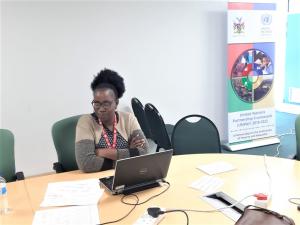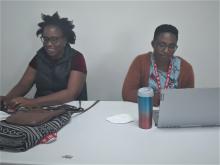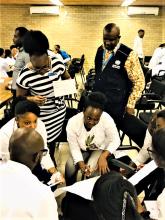Health worker in massive awe of contact tracing Coronavirus workers
Ndilimeke Mutikisha, a Regional Environmental Health Practitioner for the Otjozondjupa Health Directorate under Public and Environmental Health services, is in massive awe of contact tracing workers who are keeping people going amid the Coronavirus (COVID-19) pandemic. Mutikisha, who also serves as the National Head of Contact Tracing for COVID-19 in Windhoek, is impressed with the work that those in key jobs are doing to help save lives and provide people with essentials during the current global health crisis.
Mutikisha said, “Over the past few months I have been awe-strucked with the incredible work that the contact tracing team and other emergency responders have done in response to COVID-19. It is great to hear how frontline workers are supporting the nation to build resilience, along with responding to human distress in extreme situations”.
An insight into the diverse meaning of how COVID-19 contact tracing data is collected and reported, is vital to understanding the opportunities and challenges to improving public health in COVID times. According to the World Health Organization, for COVID-19, a contact is defined as anyone with the following exposures to a COVID-19 case, from 2 days before to 14 days after the case’s onset of illness:
- Being within 1 metre of a COVID-19 case for >15 minutes;
- Direct physical contact with a COVID-19 case;
- Providing direct care for patients with COVID-19 disease without using proper personal protective equipment (PPE)
Mutikisha explains, “By means of an interview, contact tracing healthcare workers engage with COVID-19 positive patients by asking a series of detailed questions to determine level of exposure and risk. First, the latter is asked where they might have picked up the virus. Second, with whom they have been in contact with. Finally, if they may have potentially spread the virus to others. In this sense, information on location and case movement are pivotal when identifying possible hotspots that could erupt and result in fatal cases if prompt action is not taken”.
Mutikisha’s awe for healthcare workers also extends to their efforts in fighting social stigma and its consequences. As stated by a fact sheet (24 February 2020) from the World Health Organization (WHO), United Nations Children's Fund (UNICEF) and International Federation of Red Cross (IFRC), social stigma in the context of health is the negative association between a person or group of people who share certain characteristics and a specific disease. Undeniably, the outbreak of COVID-19 has created social stigma and discriminatory behavior towards individuals who are perceived to have any contact with the disease. Unfortunately Namibia is no exception of this. Therefore, as Namibians we are in dire need of strategies to reduce the tension related to the pandemic and to mitigate the stigma surrounding it.
When asked what Namibia is implementing to counter stigma against affected people, Mutikisha responds by saying, “The development of messages by the Risk Communications Community and Engagement (RCCE) committee are being shared across different social media. These messages educate people by discouraging the practice of stigma. Moreover, people who have experienced stigma undergo necessary counselling and psychosocial support. Furthermore, health workers are coming up with methods to make sure that the confidentiality of COVID-19 results is respected. Finally, healthcare workers adhere to a standard of being discrete, when approaching a person in the community for their samples”.
While Mutikisha has admired the work carried out by healthcare workers during COVID-19, she also prides herself on other achievements accomplished during the pandemic. Mutikisha adds, “I was part of the team that developed the surveillance standard operating procedures, including the design and implementation of surveillance training along with simulation, posters and other learning tools. Additionally, I supported integrated online training for all pillars, where over 600 people were trained across the country. Lastly, I was part of the national team deployed to the Walvis Bay district to investigate community transmission and, set up response structures to control the spread of COVID-19 in the Erongo region. In addition to identifying hot spots within the Walvis Bay district, jointly with my team, we were also able to initiate effective response activities which included working with local stakeholders who in turn mobilized resources for the response”.
As the current pandemic continues to evolve, the Namibian government must think ahead of the mental health impact that COVID-19 entails for healthcare workers, including staff involved in contact tracing. Healthcare workers are expected to serve whilst dealing with the fear of contracting the virus and potentially passing this to their families. This has serious consequences, not only for the individual, but also on their productivity at the frontline and ultimately the overall response. Thus, this serves as call for decision-makers to ensure that healthcare workers are well equipped, not just in terms of essential resources, but also from a holistic approach.
Mutikisha further explains “A comprehensive approach should include prioritizing the mental health and psychosocial support of healthcare workers at all levels. Equally, it is critical to have supportive supervision and problem-solving methodologies that respond to the different needs and concerns of healthcare workers at all levels of the health system”.
Granted that we are living in world prone to diseases, Mutikisha believes that if the “awe” for health should remain, the Namibian government should continue to capitalize in health security. She states, “The upside of this investment is that we build a more humane system that leaves us more resilient in the face of future pandemics and other impending crises”. While Mutikisha commends Namibia’s response to COVID-19, she is quick to note that a return to how life was at the start of 2020 is some way off. Mutikisha says, “Even when lockdown restrictions are eased, COVID-19 will affect our lives in many ways. What might change forever, what will grapple to get back to how it was before? Such questions from a health perspective need to be critically analyzed and, effective as well as efficient solutions need to come into prompt effect”.
WHO in Namibia has been supporting the government preparedness and response and helped set up and trained the surveillance and case investigation team amongst others. WHO will continue to provide technical and financial support to the Namibian COVID-19 response as part of its mandate to protect the world from health emergencies.






